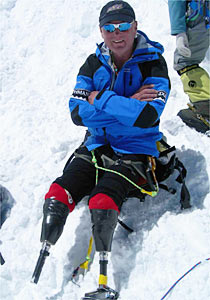|

KNOCKED
IT OFF: Kiwi mountaineer Mark Inglis has become the first
double-amputee to conquer Mt Everest, the world's highest mountain. He
faced challenges along the way, including breaking one of his
carbon-fibre prostheses. |
|
Inglis knocks Everest off
16 May 2006
Kiwi
mountaineer Mark Inglis reached the summit of Mount Everest last night
to become the first double-amputee to conquer the world's highest peak.
His
wife, Anne Inglis, sent a text message to The Press and Inglis'
supporters late last evening which said: "Mark definitely made it, back
at Camp 4. They are in high spirits. Anne."
Camp 4 is about 450m below the summit, and Inglis left from there earlier yesterday for the final assault on the peak.
Inglis,
who lost both his legs below the knee in 1982 after being trapped in an
ice cave on Mount Cook for 14 days, reached the 8850m summit after a
gruelling 40 days on Everest.
The
47-year-old Paralympics cycling silver medallist and his team of about
16 New Zealand climbers and Tibetan sherpas set out from Tibet on March
25 and had aimed to reached Everest's summit by the end of this month.
Despite
a minor setback in late April when Inglis broke one of his artificial
legs in a fall, the easy acclimatisation of the crew and good weather
made them push for the summit much earlier than expected.
Despite
her husband having to use oxygen when moving in the past few days, the
team had acclimatised quickly and did not have to return to base camp
before attempting the summit, as most climbers would.
"The weather came right so they thought they'd go for it," she said.
Inglis
headed for the summit with the best wishes of Everest's first
conqueror, Sir Edmund Hillary, who said earlier that he wished the
climber the best of luck.
Inglis has been aiming for Everest for more than 20 years.
In
2004, another amputee climber, Nawang Sherpa of Tibet, conquered
Everest, but Inglis will be the first double-amputee to reach the peak.
He
became the second double-amputee to climb the sixth-highest mountain in
the world, Cho Oyu, in 2004, after British double-amputee Norman
Croucher in 1995.
Inglis
said on his website that it was from the top of Cho Oyu, in the
Himalayas, that he realised Everest would be his next goal.
"I
stood on the summit of Cho Oyu ... and looked directly across at
Everest, only about 650m higher, and knew that what I was seeing was my
next challenge," he said.
Before
leaving for Tibet, Inglis said that having artificial legs made
climbing about 20 per cent tougher, but it did have some advantages as
he had less muscle and a proportionately larger blood volume, so he was
warmer at higher altitudes and got more oxygen.
In
his online Everest diary, he describes how he earned the nickname
Penguin: "Just because I am the only one sunbathing and sitting around
in shorts and T-shirts while they wear down, I'm sure I'm not the
unusual one!"
Christchurch
mountaineer Ross Cullen, who made an unsuccessful attempt on Everest in
1985, said the hardest part of the climb was near the peak, where there
was a rock face of about 20m.
"It's a difficult thing to do. Not many people are willing to stick their neck out that far," he said.
"He's
(Inglis) got a bit of a mixed bag. He's probably got less balance than
normal climbers have, and he has things like his legs breaking ... but
he claims his circulation keeps him warmer at high altitudes."
Since 1982, Inglis has been working with organisations to encourage others with disabilities to pursue their dreams.
"Each and everyone of us can do anything we put our minds to."
Canterbury
ParaFed operations manager Ken Sowden said Inglis' achievements
transcended disabilities and he was inspirational to all New
Zealanders.
"I think that's unique about him," he said. "Whatever he sets his mind to he does very well."
Anne Inglis said his attitude had a lot to do with determination and keeping a positive attitude.
"A
lot of it's to promote what you can do whether you're disabled or not,"
she said. "If you've got a dream, don't let anything stop you from
doing it."
»PRINTABLE VERSION
»SUBSCRIBE TO FREE HEADLINES
»SUBSCRIBE TO ARCHIVESTUFF
|

